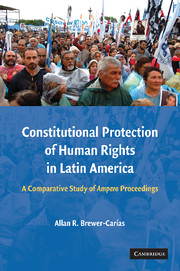 Constitutional Protection of Human Rights in Latin America
Constitutional Protection of Human Rights in Latin America Book contents
- Frontmatter
- Contents
- INTRODUCTION
- PART ONE THE CONSTITUTIONAL AND INTERNATIONAL DECLARATION OF HUMAN RIGHTS AND ITS JUDICIAL GUARANTIES
- PART TWO THE AMPARO AS A LATIN AMERICAN CONSTITUTIONAL AND INTERNATIONAL LAW INSTITUTION
- PART THREE THE INJURED PARTY AND THE CONSTITUTIONAL RIGHTS PROTECTED BY MEANS OF THE AMPARO PROCEEDING
- PART FOUR THE INJURY, THE INJURING PARTY AND THE INJURING ACTS OR OMISSIONS IN THE AMPARO PROCEEDING
- PART FIVE THE EXTRAORDINARY CHARACTER OF THE AMPARO PROCEEDING
- CONCLUSION
- APPENDIX A List of Latin American Constitutions
- APPENDIX B List of Latin American Amparo Laws (Statutes)
- INDEX
PART THREE - THE INJURED PARTY AND THE CONSTITUTIONAL RIGHTS PROTECTED BY MEANS OF THE AMPARO PROCEEDING
Published online by Cambridge University Press: 08 August 2009
- Frontmatter
- Contents
- INTRODUCTION
- PART ONE THE CONSTITUTIONAL AND INTERNATIONAL DECLARATION OF HUMAN RIGHTS AND ITS JUDICIAL GUARANTIES
- PART TWO THE AMPARO AS A LATIN AMERICAN CONSTITUTIONAL AND INTERNATIONAL LAW INSTITUTION
- PART THREE THE INJURED PARTY AND THE CONSTITUTIONAL RIGHTS PROTECTED BY MEANS OF THE AMPARO PROCEEDING
- PART FOUR THE INJURY, THE INJURING PARTY AND THE INJURING ACTS OR OMISSIONS IN THE AMPARO PROCEEDING
- PART FIVE THE EXTRAORDINARY CHARACTER OF THE AMPARO PROCEEDING
- CONCLUSION
- APPENDIX A List of Latin American Constitutions
- APPENDIX B List of Latin American Amparo Laws (Statutes)
- INDEX
Summary
One of the most distinguishable principles regarding the amparo proceeding as an extraordinary judicial mean for the protection of constitutional rights is the principle of bilateralism, which implies the need for the existence of a controversy between two or more parties. The main consequence of this principle is that the amparo proceeding can only be initiated at a party's request, which excludes any case of ex officio amparo proceeding, except in some countries, on matters of habeas corpus.
Consequently, in order to initiate this proceeding an action, a recourse or a petition must be brought before a court by a plaintiff as the injured party, against the injurer party or parties, who as defendants, must be called to the procedure as having caused the harm or the violation to the constitutional rights of the former. Because of this principle of bilateralism, all the Amparo Laws in Latin America contain specific provisions regarding both parties.
On the other hand, the right violated in order to be protected by means of the amparo proceeding must be a constitutional right declared in the constitution or recognized with constitutional rank.
This section of the book is devoted to analyze, separately, the general principles related to the rules of standing, and the justiciable rights by means of the amparo, with particular reference to the question of the justiciability of social rights.
- Type
- Chapter
- Information
- Constitutional Protection of Human Rights in Latin AmericaA Comparative Study of Amparo Proceedings, pp. 179 - 180Publisher: Cambridge University PressPrint publication year: 2008


